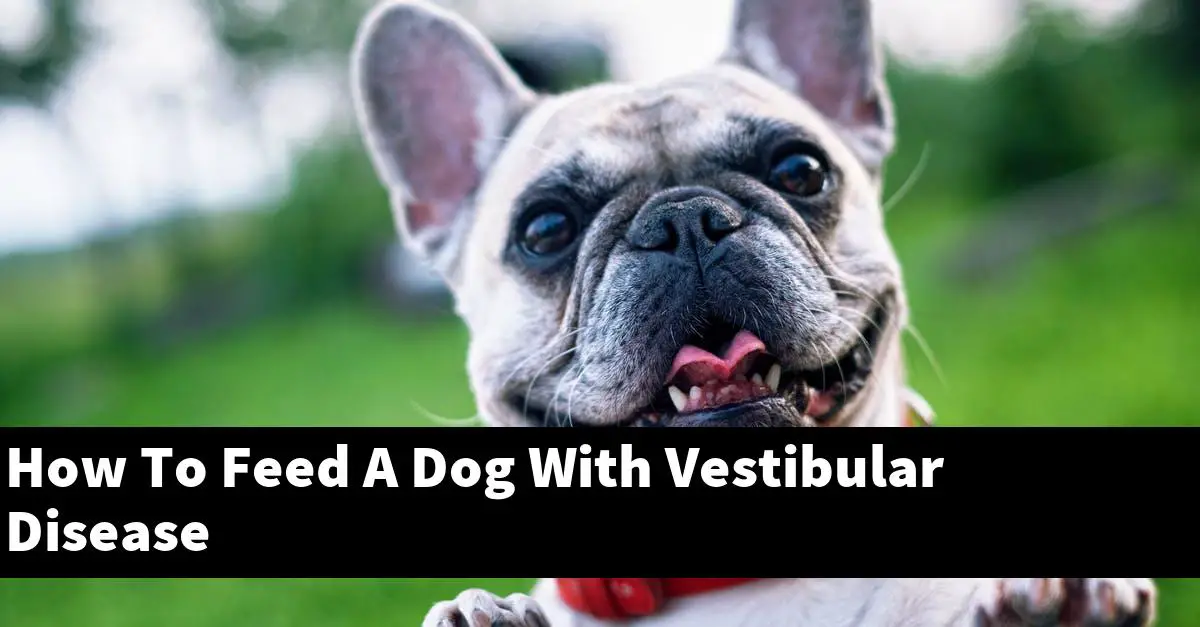How can I help my dog with vestibular disease?
The best way to feed a dog with vestibular disease is to give them small, frequent meals of soft, easily digestible food. Meals should be spaced out throughout the day so that the dog has time to rest and digest in between.
The article will be covering how to properly feed a dog with vestibular disease so that they can get the nutrition they need without making their condition worse.
Table of Contents
How do you know if a dog has vestibular disease?
If you think your dog may have vestibular disease, there are some key signs to look for. These include:
- Sudden onset of nausea and vomiting
- Loss of balance and coordination
- Head tilt
- Eyes darting back and forth or moving in circles
- Staggering or falling
If you notice any of these signs, it’s important to take your dog to the vet right away. Vestibular disease can be caused by many different things, including inner ear infections, tumors, and strokes, so it’s important to get a diagnosis as soon as possible.
What are the symptoms of vestibular disease in dogs?
The most common symptom of vestibular disease in dogs is a sudden onset of head tilt. This can be accompanied by a loss of balance, circling, and nystagmus (an abnormal movement of the eyes).
Other symptoms may include vomiting, lethargy, and lack of appetite. Vestibular disease is a condition that affects the vestibular system, which is responsible for balance and movement. The exact cause is unknown, but it is thought to be caused by an inner ear infection or inflammation. Treatment is typically supportive and may include anti-nausea medication, fluid therapy, and rest.
How is vestibular disease treated in dogs?
Vestibular disease is a condition that affects the balance and movement of a dog. The most common symptom of vestibular disease is a sudden onset of head tilt. Other symptoms can include circling, falling, rolling, and nystagmus (an abnormal movement of the eyes).
Vestibular disease can be caused by many things, including inner ear infections, tumors, and strokes. Treatment of vestibular disease depends on the underlying cause. If an infection is the cause, antibiotics will be prescribed.
If a tumor is the cause, surgery may be necessary. If a stroke is the cause, treatment will be aimed at supporting the dog and helping them recover. Vestibular disease can be a serious condition, but many dogs make a full recovery with treatment.
What are the long-term effects of vestibular disease in dogs?
There are many different types of vestibular disease in dogs, each with its own set of long-term effects. The most common type of vestibular disease is idiopathic vestibular syndrome, which is caused by an unknown injury or abnormality to the vestibular system.
This type of vestibular disease can cause a dog to lose its balance and coordination, and can also lead to vertigo, a condition in which the dog feels like it is spinning or rotating even when it is not moving. In severe cases, idiopathic vestibular syndrome can cause a dog to lose its appetite, vomit, and have trouble walking.
Although most dogs with idiopathic vestibular syndrome recover within a few weeks, some may experience long-term effects such as head tilt, nystagmus (involuntary eye movements), and balance problems.
Do dogs stop eating with vestibular disease?
A dog’s vestibular system is responsible for their sense of balance. When this system is not functioning properly, it can result in vestibular disease. This disease can cause a variety of symptoms in dogs, including a loss of appetite.
Many dogs with vestibular disease will stop eating altogether. This is because the disease can cause nausea and vomiting, which can make eating very uncomfortable. In some cases, the disease can also cause difficulty swallowing, which can make it even harder for a dog to eat.
If your dog has vestibular disease, it is important to work with your veterinarian to come up with a treatment plan. In some cases, the disease will resolve on its own and your dog will be able to start eating again. However, in other cases, more aggressive treatment may be needed. This could include medication to help control the symptoms or even surgery.
No matter what, it is important to make sure your dog is getting the nutrients they need. If they are not eating, they may need to be fed through a feeding tube. This will ensure that they are getting the calories and nutrients they need to stay healthy.
Do dogs lose their appetite with vestibular disease?
Dogs with vestibular disease may lose their appetite because of the nausea and vomiting that can accompany the condition. Vestibular disease is a disorder of the inner ear that can cause a variety of symptoms, including vertigo, dizziness, and loss of balance.
Nausea and vomiting are common side effects of vestibular disease, and can lead to a loss of appetite. If your dog is experiencing any of these symptoms, it is important to consult with your veterinarian to determine the cause and get appropriate treatment.
How long does it take a dog to recover from vestibular disease?
The vestibular system is responsible for maintaining balance and coordinating movement. When the vestibular system is not functioning properly, it is called vestibular disease.
Vestibular disease can be caused by many things, including infections, tumors, inner ear problems, and head trauma. The symptoms of vestibular disease include loss of balance, dizziness, and nausea.
The severity of the symptoms depends on the underlying cause of the vestibular disease. In most cases, the symptoms will resolve within a few days to a week. However, some dogs may experience chronic vestibular disease that can last for months or even years.
If your dog is showing signs of vestibular disease, it is important to take them to the veterinarian for a proper diagnosis. The veterinarian will likely recommend a course of treatment based on the underlying cause of the vestibular disease. In most cases, the treatment will be able to resolve the symptoms and allow your dog to return to their normal life.
Can vestibular disease in dogs get worse?
Yes, vestibular disease in dogs can get worse. If the underlying cause is not treated, the condition can progress and lead to more serious health problems. Untreated vestibular disease can cause loss of balance, difficulty walking, and even complete paralysis. In severe cases, it can be fatal.
If you suspect your dog has vestibular disease, it is important to seek veterinary care as soon as possible.
Conclusion
Vestibular disease is a common condition in dogs, and can be caused by a variety of factors. While the condition can be serious, most dogs recover with proper treatment. The first step in treating vestibular disease is to identify the underlying cause.
If the cause is unknown, your veterinarian may recommend a course of treatment to help your dog recover. Treatment may include medication, physical therapy, and changes to your dog’s diet.


